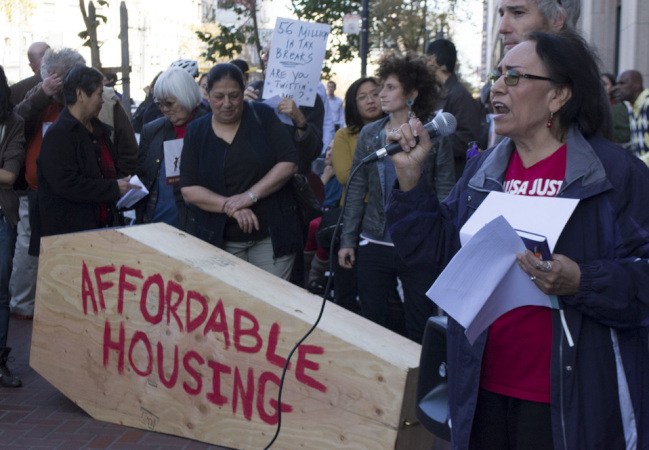"On the one hand, [voters in San Francisco] want the economy to be strong and think things are moving in right direction," said Corey Cook, USF political science professor and co-author of the study, to KQED's Joshua Johnson. "On the other hand ... they said their chief concern is affordability — particularly housing affordability — so there’s clearly an underlying sense of anxiety."
Most respondents see the tech boom as being most beneficial for tech execs and workers; a clear majority say that the city's tech sector is also good for other white collar workers and the city overall. But that positive sentiment is qualified.
"They say, 'I don't see it benefiting me and my family,' and there’s anxiety about whether people will be allowed to stay," Cook said. He notes that the highest numbers of respondents for whom cost of living is a problem are "middle earners," those reporting income between $30,000 and $130,000.
In a story on the USF survey, the San Francisco Chronicle pointed out that:
Technology companies have created 23,500 jobs since 2009 and have helped drop the city's unemployment rate to 5.3 percent, the lowest in five years. City coffers are once again full, and the big cuts to social services and parks that were seen during the recession aren't happening anymore.
At the same time, evictions are up 38 percent since 2010, and Ellis Act evictions, usually used when a landlord wants to sell a building, are up 170 percent. The median home sale price in the city hit $1 million in the summer.
The majority of USF survey respondents said the spike in the cost of living has been recent, and strongly support the idea that city government should enact policies to preserve affordability. These efforts range from addressing Ellis Act evictions to getting more affordable housing in the pipeline and built.
Most interesting to Cook was how respondents feel about the tech companies. Despite not thinking that they are personally benefiting much from the boom, respondents do not want to make it difficult for tech firms to move into the city:
Voters generally are still saying, "No, we want the jobs here in San Francisco. So do what it takes to get businesses here. We should expect something of them when they come. So if you’re going to negotiate community benefits agreements and things like that, we want them to play a role in the city, so we don’t just have them locate here and not be a part of the civic community."
"At the same time, they’re not saying, 'Make it tough for tech companies to come in, let's regulate them and tax them.' What they’re saying is, 'Continue to grow the economy, and let’s find some balance.'"
Here are the USF survey results:
